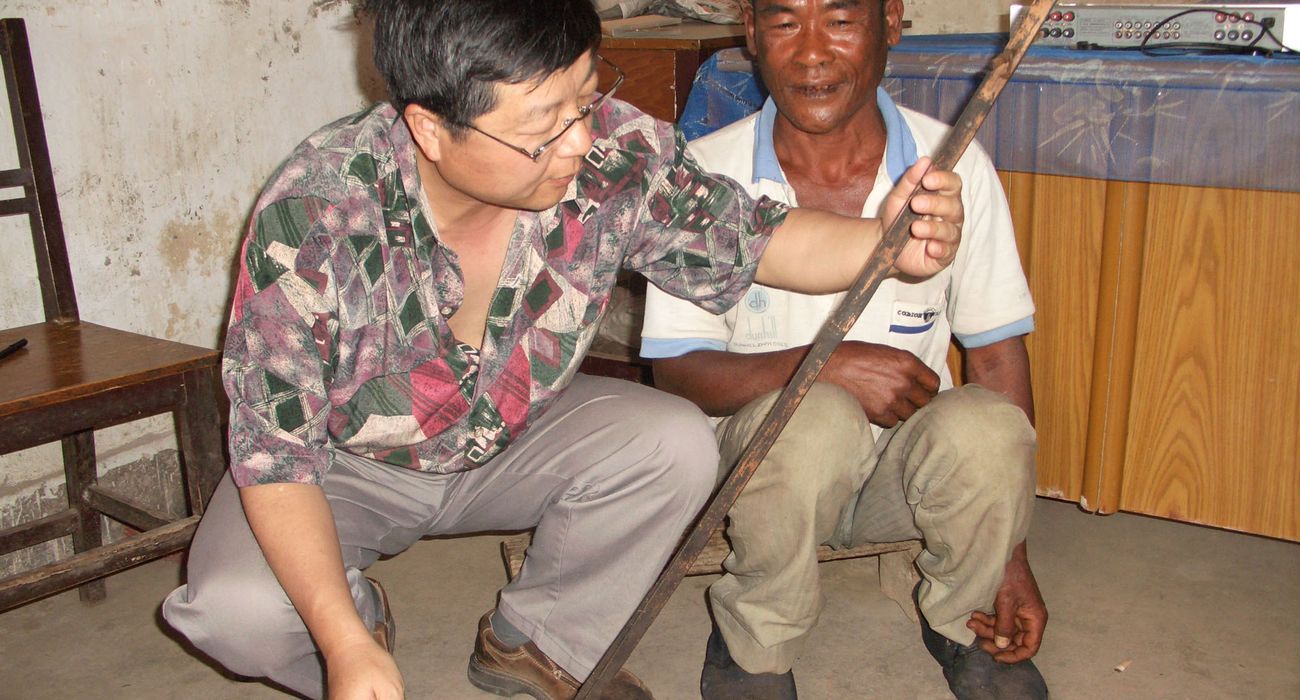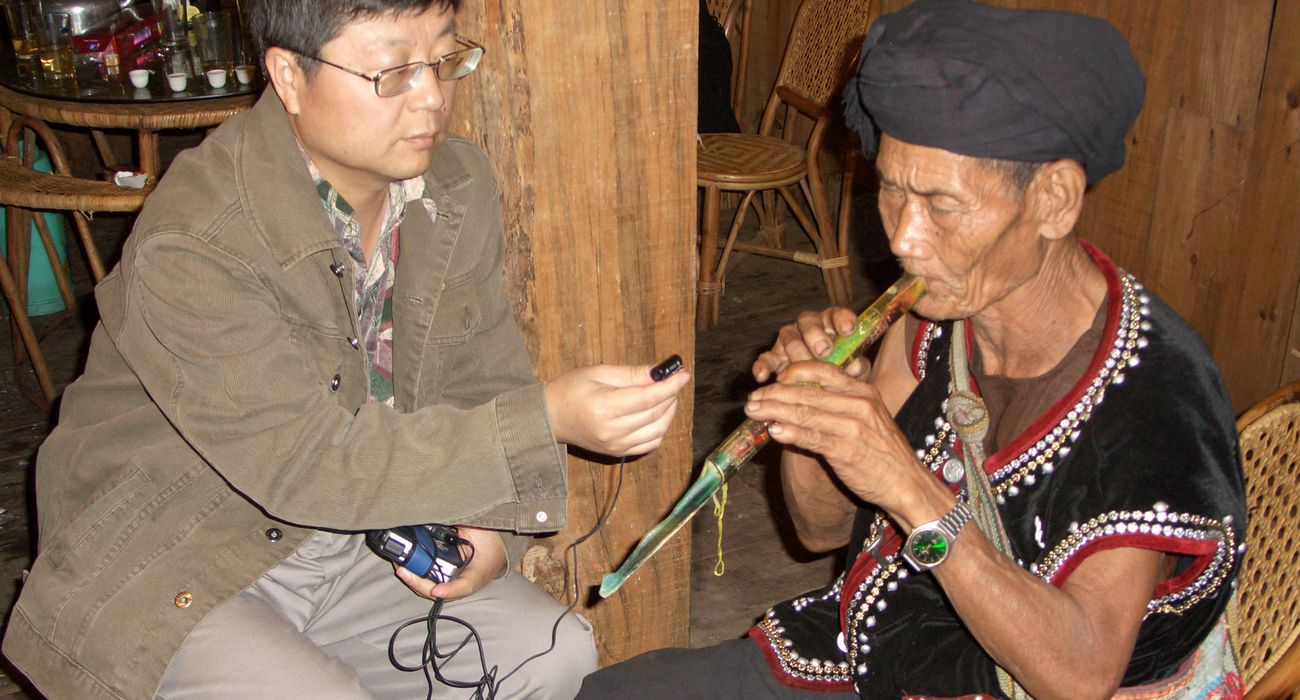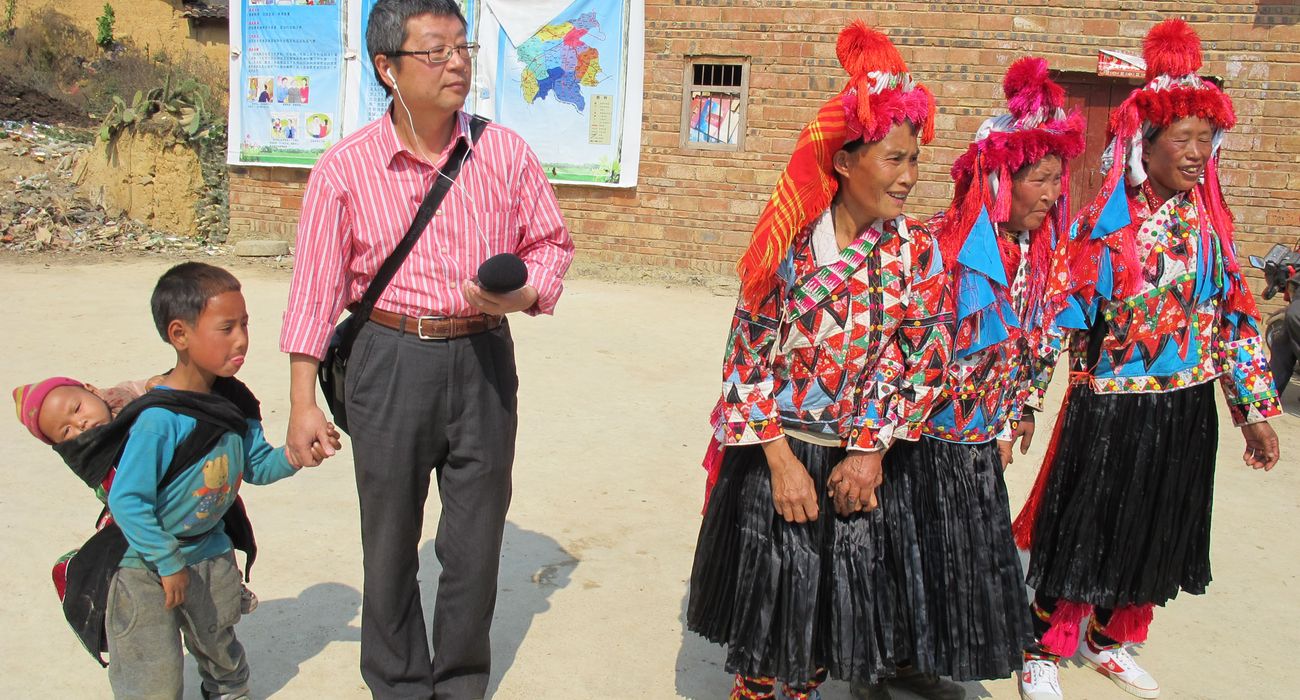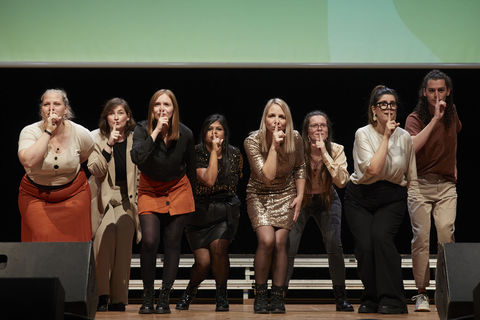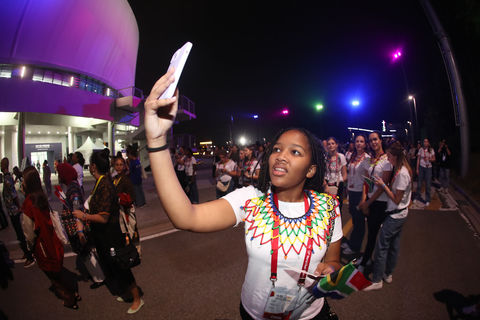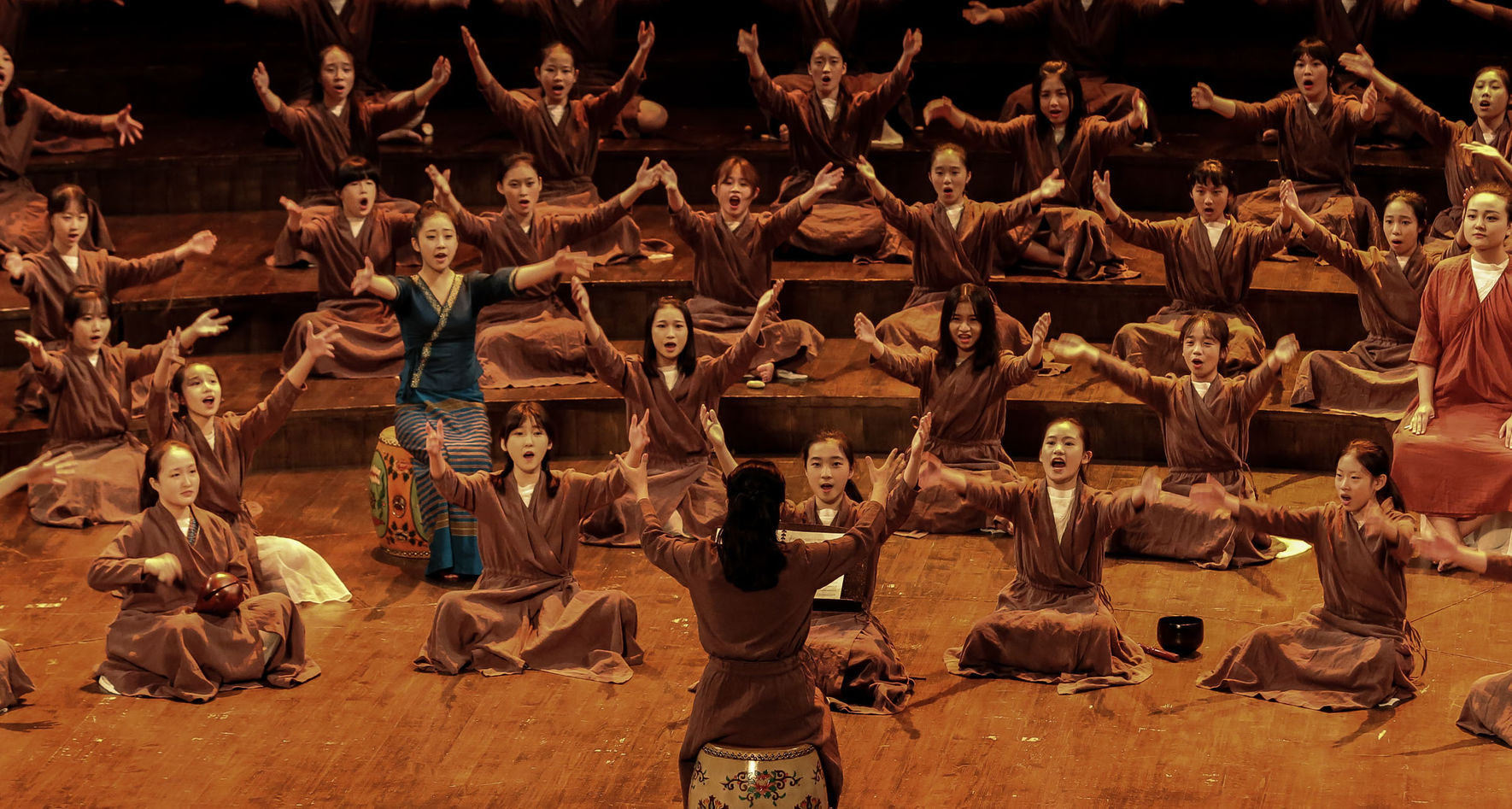
Chinese ethnic music is one step away from the world music
Interview with Chinese composer Liu Xiaogeng
Professor Liu Xiaogeng is an award-winning composer in China. He has composed music of many different genres, including symphonies, ballet, choral music, vocal solo and instrumental solo music. In this interview with Xu Qian, Secretary-General of the Shenzhen Chorus Association, he speaks about his music and the development of Chinese choral music in recent years.
Xu Qian: According to statistics, your compositions were performed most by Chinese choirs in international competitions and concerts in 2019. I know you focus on the traditional classical music composition in your whole life. Your works covered so wide styles, where do you draw your inspiration from?
Liu Xiaogeng: For the past few decades, my footsteps were marked every village, forest and field in Yunnan when collecting thousands of folk songs from people. These materials, as well as the local customs of ethnic minorities in various regions, are deeply imprinted in my mind. The sounds that grow from that land always stimulate my creative inspiration, it rooted in my heart.
Xu Qian: In your works there are many oldest elements of different nationalities, sounds like the music from very ancient past, meanwhile it also follows the most contemporary arts. How do you define your own works?
Liu Xiaogeng: Chinese ethnic music is one step away from the world music. However, due to the backward transportation and economy in a very long historical period, much ancient music is buried deep in the mountains, and no one knows it. For this reason, how to carry on the folk music which was handed down orally by the ancestors of various nationalities has always been in my head. Most of the folk music in China is presented in the form of monophonic music. Therefore, it must be broken, recombined and split to make it rise to an existing high artistic level.
Xu Qian: For many nationalities living in China, they have their own language but no character, you use quite a lot of those languages in your works; what do you think is the most important to transfer to people in your works?
Liu Xiaogeng: Minority native language has its unique charm; therefore, to use native language to create various nationalities’ works is the direction I insisted for a long time. In the early 1990’s, I composed a children's chorus "water beetles” by using the language of Zhuang nationality. Many of Chinese children's choirs choose this work to performances in World Choir Games, and got good results. The most typical example is “Saliluo”. In this work, I use the elements of the mother tongue from eight different nationalities and contemporary minimalism composition techniques to present a colorful and vibrant artistic effect. In 2017, when 20 anniversary of Shenzhen Lily Girls’ Choir concert they challenged one of my work “Tattoo” which originally is for male chorus – the story of sacrifice of manhood in Dai nationality. When I composed it I listened to more than 700 verses from old religions of Dai in their own language over and over again and finally selected several phrases, the great tension from Language and music combined together in this piece. The basic mission of my creation is to discover, share and transmit the beauty of chorus via the minority's mother tongue.
Xu Qian: As the most productive composer featured in nationality arts, what is your dream commission?
Liu Xiaogeng: Chinese folk music is extensive and profound. Whenever I walk into the door of folk music of one nationality, I feel like discovering the new continent. I hope, as the great Hungarian composers Bartok and Kodály did, to dig, arrange and create those little-known folk music, so that people around the world can share this profound intangible cultural heritage.
Xu Qian: Is there any special person/ensemble in your memory you composed for?
Liu Xiaogeng: When I graduated from university, my dream was to write great works for symphony orchestra. However, due to various limitations, my interest turned to writing chorus. After the year 2000, as Chinese chorus entered the stages of the World Choir Games, more and more choirs commissioned my works, such as Shenzhen Senior High School Lily Girls’ Choir, Guangzhou Little Lark Children’s Choir, South China Normal University Choir, etc. They are wonderful choirs.
Xu Qian: Is there any story to share when you explore the old folk music from those most dangerous places?
Liu Xiaogeng: Since late 1970s, I started to go to the countryside specifically to collect folk music, when conditions were very difficult. There were no roads or electricity in many places, so I had to travel by horse or hiking. Once I accompanied the famous singer Sa Dingding to collect the folk song in the “small well” village, we met a very serious car crash and I nearly lost my life. In fact, the huge risk was accompanied every time we go deep into the hinterland of ethnic groups to collect folk songs, but it was ignored all the time for the sake of this persistent pursuit.
Xu Qian: In an impetuous current, it’s hard to take long attention from young generation. How do you see the future of Chinese choral music?
Liu Xiaogeng: The biggest regret of my generation is that we cannot go to school for 10 years (the Cultural Revolution). After the resumption of the national college entrance examination in 1977, I was able to go to university and concentrate on music composition – that was the luckiest thing of my life, therefore I really cherished this opportunity and studied very hard. Chinese choral arts was started quite late (with a history of about 100 years), which is far behind the developed countries in the world. It needs to be further improved in technical, artistic and ideological aspects of the works. I hope that more young people could go abroad to learn the trend of contemporary choral music world and create good quality original works to promote the development of Chinese choral arts.
Xu Qian: What has influenced you most in your career?
Liu Xiaogeng: A major turning point in my career came in 1996, when I went to Philippine for a year as a visiting scholar at Asian School of Religious Rites music by invitation of Dr.Francisco Feliciano (Dean of the Asian School of Religious Rites music in Philippine). Every morning I went to church choir classes and heard experts from different countries teach their native tongue choral songs, in there I was inspired to see how western church choral singing blended with the indigenous music of the Philippines. After returning to China in 1997, I composed a piece called "Coming Home”, in which the native languages of various nationalities were interwoven with the western chants, which produced a fantastic stage effect. Since then, my native language chorus writing style has been gradually formed and has been extended down. I firmly believe that this way will be broader more and more.
Professor Liu Xiaogeng
Professor Liu Xiaogeng is an award-winning composer in China. He has composed music of many different genres, including symphonies, ballet, choral music, vocal solo and instrumental solo music. He also composed music for different media such as music for film, television, and public square music. For the past several decades, professor Liu’s footsteps covered every corner of Yun Nan Province. One of his compositional signatures is to utilize ethnic languages for his choral compositions. His choir, Yun Nan Po Ya Songbook Chorus obtained First Prize in the a cappella folk music category during the 9th World Choir Games in Sochi in July of 2016. His representative pieces include: Do Sha A Bo Symphony; A nest full of birds for vocal trio; Water Beetles, Salilo, Going Home, and Running Brook for chorus. His compositions are published in several collections such as Echo of Yun Nan, Song of the River, Devotion to Long Blade, and PoYa Songbook. Professor Yang Hongnian, a famous Chinese Choral Conductor once said, “Xiaogeng collected the essence of musical elements of many ethnicities that reside in YunNan Province, and released into the musical river of world music, providing the world with much richer and refreshingly new resources. When we listen to his music we can almost experience the crisp air in the highlands. His music will continuously receive new life.”
Author: Xu Qian
Xu Qian is in her tenth year work as the organizer of choral events. From 2011-2018, she worked as a project director of INTERKULTUR China office and was in charge of the education department as well; she organized hundreds of international choral directors’ workshops & master classes over 20 cities in China, and worked as the committee member for more than 10 international choir festival projects. Since 2019, Xu Qian was elected as Secretary-General of Shenzhen Chorus Association, and get high praised from Shenzhen government by her work for the Shenzhen Choir Festival as the director of international affairs & PR. She started the Shenzhen Xinghan Culture and Arts Development Company working for the good level choirs from China tour concert in the whole world including Shenzhen Star Bright Choir, Shenzhen Senior High School Lily Girls’ Choir, Shenzhen Middle School Golden Bell Children’s Choir, Tianjin University Peiyang Choir... Beside the business in Shenzhen, Xu Qian is also the artistic consultant for different events including Hainan Maritime Silk Road Choir Festival; invited to be the Director of the International Academy Office of the Chinese Chorus Association Online Choir College. Her major in College is English language and Business management, but after graduate her career mostly spent in working in Choral Events Organization.

